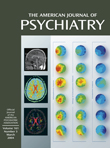Association Between Allelic Variation of Serotonin Transporter Function and Neuroticism in Anxious Cluster C Personality Disorders
Abstract
OBJECTIVE: Association between the low-activity variant of a polymorphism in the transcriptional control region of the serotonin transporter (5-HTTLPR) and neuroticism or harm avoidance was found in several but not all studies. The authors analyzed the influence of 5-HTTLPR variants on personality disorders. METHOD: Patients with personality disorders (N=320) and healthy volunteers (N=281) were studied with the Revised NEO Personality Inventory and the Tridimensional Personality Questionnaire. All were genotyped for 5-HTTLPR variants. RESULTS: No differences in 5-HTTLPR genotype distribution were detected between patients with cluster B and C personality disorders and comparison subjects. In contrast, among patients with a cluster C diagnosis, carriers of the low-activity short allele of the 5-HTTLPR exhibited higher neuroticism scores than noncarriers. CONCLUSIONS: These findings support the notion that there is no general association between the 5-HTTLPR and anxiety-related traits and that differential gene effects and/or gene-by-environment interactions are likely operative in distinct clinical subpopulations.



